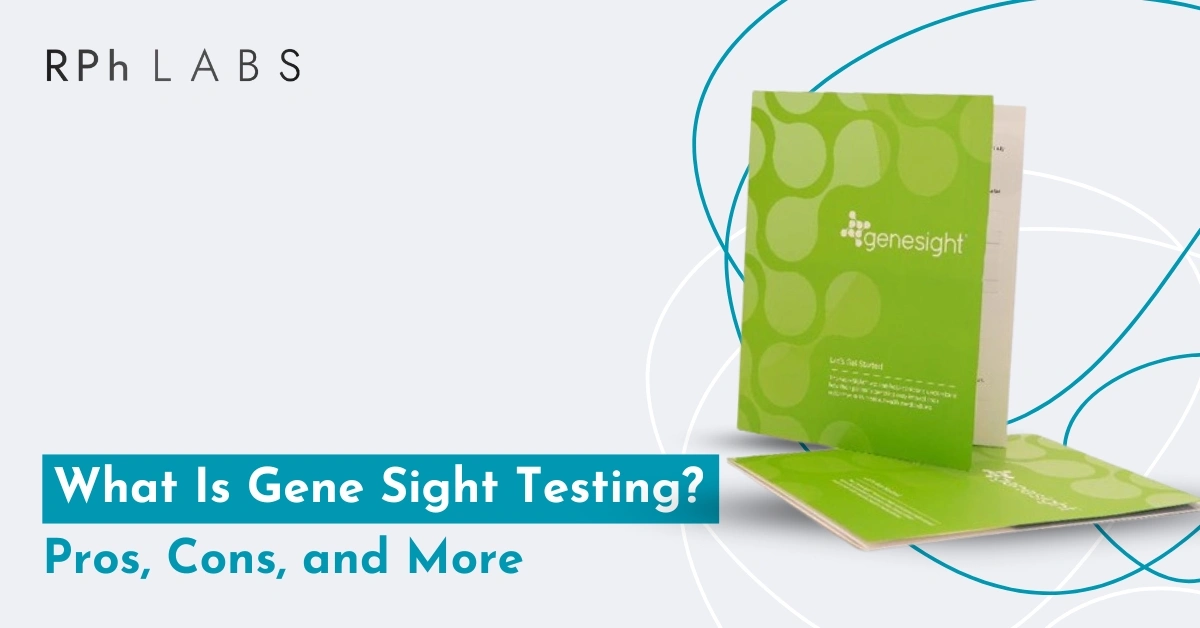
What Is Gene Sight Testing? Pros, Cons, and More
Pharmacogenomic testing, also known as PGx testing, gives insights into your genetic makeup. In case of certain medications, this information is utilised to tailor treatments that have the least chance of trial and error. GeneSight testing is a branch of pharmacogenomic testing that assists healthcare providers in tailoring psychiatric treatments, such as depression, anxiety, ADHD, and bipolar disorder. In this guide, we explore the answer to the question: What is Gene Sight Testing, including its FDA acceptance and clinical applications?
FDA Acceptance and Regulatory Status
GeneSight testing has not been approved as a standalone diagnostic tool by the U.S. Food and Drug Administration (FDA). However, the FDA recognises the potential of pharmacogenomic testing in informing medication selection and dosing when supported by robust scientific evidence. In 2020, the FDA announced a collaborative review of scientific evidence to support associations between genetic information and specific medications, indicating a growing interest in integrating genetic data into clinical decision-making.
Understanding Gene Sight Testing
How It Works
GeneSight testing analyses genetic variations in 14 genes that influence the metabolism and response to psychiatric medications. The test categorises over 60 medications into three groups:
- Use as Directed: Medications are expected to work well at standard doses.
- Moderate Gene-Drug Interaction: Medications that may require dose adjustments.
- Significant Gene-Drug Interaction: Medications that may be less effective or cause side effects due to genetic variations.
The test employs a combinatorial algorithm to integrate data from multiple genes, providing a comprehensive overview of how genetic factors may affect medication outcomes.
Benefits of GeneSight Testing
- Personalised Treatment: Assists clinicians in selecting medications that align with a patient’s genetic profile, potentially reducing trial-and-error prescribing.
- Improved Outcomes: Studies have shown that GeneSight-guided treatment can lead to higher remission and response rates in patients with major depressive disorder.
- Safety Considerations: Identifies potential risks, such as increased susceptibility to severe skin reactions like Stevens-Johnson Syndrome when taking certain medications.
Limitations - Not a Diagnostic Tool: GeneSight testing does not diagnose mental health conditions or predict medication efficacy with absolute certainty.
- Genetic Variability: Genetic factors are just one aspect of medication response; other elements like environment and lifestyle also play significant roles.
- Insurance Coverage: Coverage varies among insurance providers, and some plans may not fully reimburse the cost of the test.
FDA-Approved Antidepressants with Pharmacogenomic Evidence
The FDA has identified certain antidepressants for which pharmacogenomic information is included in the drug labelling, indicating that genetic factors can influence drug metabolism and response. These include:
- Citalopram (Celexa)
- Escitalopram (Lexapro)
- Fluoxetine (Prozac)
- Paroxetine (Paxil)
- Sertraline (Zoloft)
- Amitriptyline (Elavil)
- Nortriptyline (Pamelor)
- Duloxetine (Cymbalta)
- Venlafaxine (Effexor)
- Mirtazapine (Remeron)
- Trazodone (Desyrel)
- Bupropion (Wellbutrin)
- Vortioxetine (Trintellix)
These medications have sufficient pharmacogenomic evidence to warrant consideration of genetic factors in their prescribing.
Book an at-home PGx test from RPh LABS now.
Cost of Genesight With and Without Insurance Coverage
The GeneSight testing cost varies depending on insurance coverage and financial assistance programs:
- Medicare (Part B): This insurance plan typically covers the full cost, resulting in $0 out-of-pocket costs.
- Medicare Advantage (Part C): Coverage may vary; patients might pay a portion of the cost.
- Medicaid: Often covers the full cost, leading to $0 out-of-pocket expenses.
- Commercial Insurance: Coverage varies; patients may pay a portion of the cost, typically less than $300.
- Uninsured: A reduced self-pay option is available, with costs around $300.
History of GeneSight Testing
Gene Sight testing emerged from advancements in pharmacogenomics, the study of how genes affect individual responses to medications. The test was developed by Myriad Genetics and has been utilised by healthcare providers to personalise psychiatric treatment plans. Over time, the test has undergone enhancements to include a broader range of medications and genetic markers, aiming to improve the precision of psychiatric care.
Future Outlook
The field of pharmacogenomics continues to evolve, with ongoing research aimed at expanding the understanding of genetic influences on medication response. Future developments may include:
- Expanded Genetic Markers: Incorporating additional genes to provide a more comprehensive analysis.
- Broader Medication Coverage: Including a wider array of psychiatric medications in testing panels.
- Integration with Electronic Health Records (EHRs): Facilitating seamless incorporation of genetic information into clinical decision-making processes.
As research progresses, pharmacogenomic testing like GeneSight may become an integral component of personalised psychiatric care.
Conclusion
Genetic testing for medication is commonly known as pharmacogenomics testing or PGx. GeneSight is a pharmacogenomic test that focuses on how a patient’s genes may affect their response to psychiatric medications. The answer to ‘how accurate is genetic testing for psychiatric medications’ depends on which medication you are going to be administered. A PGx test from RPh LABS (CLIA certified) shows how your body may respond to 250+ medications. Unsure about the at-home PGx testing? Here is how it works.
Disclaimer: This blog is only for informational purposes. Please always consult a doctor before taking any medical action.



Leave a Reply